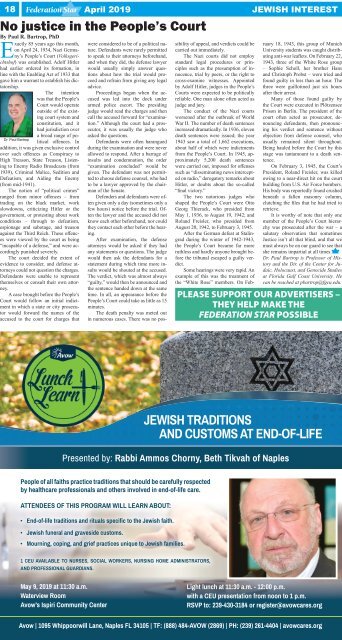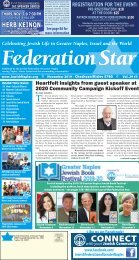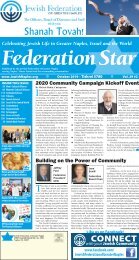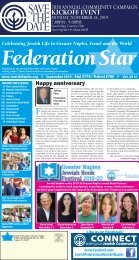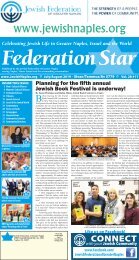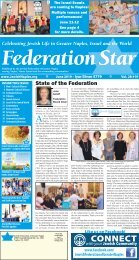Federation Star - April 2019
Monthly newspaper of the Jewish Federation of Greater Naples
Monthly newspaper of the Jewish Federation of Greater Naples
You also want an ePaper? Increase the reach of your titles
YUMPU automatically turns print PDFs into web optimized ePapers that Google loves.
18 <strong>Federation</strong> <strong>Star</strong> <strong>April</strong> <strong>2019</strong><br />
No justice in the People’s Court<br />
By Paul R. Bartrop, PhD<br />
Exactly 85 years ago this month,<br />
on <strong>April</strong> 24, 1934, Nazi Germany’s<br />
People’s Court (Volksgerichtshof)<br />
was established. Adolf Hitler<br />
had earlier ordered its formation, in<br />
line with the Enabling Act of 1933 that<br />
gave him a warrant to establish his dictatorship.<br />
The intention<br />
was that the People’s<br />
Court would operate<br />
outside of the existing<br />
court system and<br />
constitution, and it<br />
had jurisdiction over<br />
a broad range of political<br />
offences. In<br />
Dr. Paul Bartrop<br />
addition, it was given exclusive control<br />
over such offences as Conspiracy to<br />
High Treason, State Treason, Listening<br />
to Enemy Radio Broadcasts (from<br />
1939), Criminal Malice, Sedition and<br />
Defeatism, and Aiding the Enemy<br />
(from mid-1941).<br />
The notion of “political crimes”<br />
ranged from minor offences – from<br />
trading on the black market, work<br />
slowdowns, criticizing Hitler or the<br />
government, or protesting about work<br />
conditions – through to defeatism,<br />
espionage and sabotage, and treason<br />
against the Third Reich. These offences<br />
were viewed by the court as being<br />
“incapable of a defense,” and were accordingly<br />
punished severely.<br />
The court decided the extent of<br />
evidence to consider, and defense attorneys<br />
could not question the charges.<br />
Defendants were unable to represent<br />
themselves or consult their own attorney.<br />
A case brought before the People’s<br />
Court would follow an initial indictment<br />
in which a state or city prosecutor<br />
would forward the names of the<br />
accused to the court for charges that<br />
JEWISH INTEREST<br />
were considered to be of a political nature.<br />
Defendants were rarely permitted<br />
to speak to their attorneys beforehand,<br />
and when they did, the defense lawyer<br />
would usually simply answer questions<br />
about how the trial would proceed<br />
and refrain from giving any legal<br />
advice.<br />
Proceedings began when the accused<br />
was led into the dock under<br />
armed police escort. The presiding<br />
judge would read the charges and then<br />
call the accused forward for “examination.”<br />
Although the court had a prosecutor,<br />
it was usually the judge who<br />
asked the questions.<br />
Defendants were often harangued<br />
during the examination and were never<br />
allowed to respond. After a barrage of<br />
insults and condemnation, the order<br />
“examination concluded” would be<br />
given. The defendant was not permitted<br />
to choose defense counsel, who had<br />
to be a lawyer approved by the chairman<br />
of the Senate.<br />
Defenders and defendants were often<br />
given only a day (sometimes only a<br />
few hours) notice before the trial. Often<br />
the lawyer and the accused did not<br />
know each other beforehand, nor could<br />
they contact each other before the hearing.<br />
After examination, the defense<br />
attorneys would be asked if they had<br />
any statements or questions. The judge<br />
would then ask the defendants for a<br />
statement during which time more insults<br />
would be shouted at the accused.<br />
The verdict, which was almost always<br />
“guilty,” would then be announced and<br />
the sentence handed down at the same<br />
time. In all, an appearance before the<br />
People’s Court could take as little as 15<br />
minutes.<br />
The death penalty was meted out<br />
in numerous cases. There was no possibility<br />
of appeal, and verdicts could be<br />
carried out immediately.<br />
The Nazi courts did not employ<br />
standard legal procedures or principles<br />
such as the presumption of innocence,<br />
trial by peers, or the right to<br />
cross-examine witnesses. Appointed<br />
by Adolf Hitler, judges in the People’s<br />
Courts were expected to be politically<br />
reliable. One man alone often acted as<br />
judge and jury.<br />
The conduct of the Nazi courts<br />
worsened after the outbreak of World<br />
War II. The number of death sentences<br />
increased dramatically. In 1936, eleven<br />
death sentences were issued; the year<br />
1943 saw a total of 1,662 executions,<br />
about half of which were indictments<br />
from the People’s Court. In 1945, approximately<br />
5,200 death sentences<br />
were carried out, imposed for offenses<br />
such as “disseminating news intercepted<br />
on radio,” derogatory remarks about<br />
Hitler, or doubts about the so-called<br />
“final victory.”<br />
The two notorious judges who<br />
shaped the People’s Court were Otto<br />
Georg Thierack, who presided from<br />
May 1, 1936, to August 19, 1942; and<br />
Roland Freisler, who presided from<br />
August 20, 1942, to February 3, 1945.<br />
After the German defeat at Stalingrad<br />
during the winter of 1942-1943,<br />
the People’s Court became far more<br />
ruthless and hardly anyone brought before<br />
the tribunal escaped a guilty verdict.<br />
Some hearings were very rapid. An<br />
example of this was the treatment of<br />
the “White Rose” members. On February<br />
18, 1943, this group of Munich<br />
University students was caught distributing<br />
anti-war leaflets. On February 22,<br />
1943, three of the White Rose group<br />
– Sophie Scholl, her brother Hans<br />
and Christoph Probst – were tried and<br />
found guilty in less than an hour. The<br />
three were guillotined just six hours<br />
after their arrest.<br />
Many of those found guilty by<br />
the Court were executed in Plötzensee<br />
Prison in Berlin. The president of the<br />
court often acted as prosecutor, denouncing<br />
defendants, then pronouncing<br />
his verdict and sentence without<br />
objection from defense counsel, who<br />
usually remained silent throughout.<br />
Being hauled before the Court by this<br />
stage was tantamount to a death sentence.<br />
On February 3, 1945, the Court’s<br />
President, Roland Freisler, was killed<br />
owing to a near-direct hit on the court<br />
building from U.S. Air Force bombers.<br />
His body was reportedly found crushed<br />
beneath a fallen masonry column,<br />
clutching the files that he had tried to<br />
retrieve.<br />
It is worthy of note that only one<br />
member of the People’s Court hierarchy<br />
was prosecuted after the war – a<br />
salutary observation that sometimes<br />
Justice isn’t all that blind, and that we<br />
must always be on our guard to see that<br />
she remains impartial at all times.<br />
Dr. Paul Bartrop is Professor of History<br />
and the Dir. of the Center for Judaic,<br />
Holocaust, and Genocide Studies<br />
at Florida Gulf Coast University. He<br />
can be reached at pbartrop@fgcu.edu.<br />
PLEASE SUPPORT OUR ADVERTISERS –<br />
THEY HELP MAKE THE<br />
FEDERATION STAR POSSIBLE<br />
JEWISH TRADITIONS<br />
AND CUSTOMS AT END-OF-LIFE<br />
Presented by: Rabbi Ammos Chorny, Beth Tikvah of Naples<br />
People of all faiths practice traditions that should be carefully respected<br />
by healthcare professionals and others involved in end-of-life care.<br />
ATTENDEES OF THIS PROGRAM WILL LEARN ABOUT:<br />
• End-of-life traditions and rituals specific to the Jewish faith.<br />
• Jewish funeral and graveside customs.<br />
• Mourning, coping, and grief practices unique to Jewish families.<br />
1 CEU AVAILABLE TO NURSES, SOCIAL WORKERS, NURSING HOME ADMINISTRATORS,<br />
AND PROFESSIONAL GUARDIANS.<br />
May 9, <strong>2019</strong> at 11:30 a.m.<br />
Waterview Room<br />
Avow’s Ispiri Community Center<br />
Light lunch at 11:30 a.m. - 12:00 p.m.<br />
with a CEU presentation from noon to 1 p.m.<br />
RSVP to: 239-430-3184 or register@avowcares.org<br />
Avow | 1095 Whippoorwill Lane, Naples FL 34105 | TF: (888) 484-AVOW (2869) | PH: (239) 261-4404 | avowcares.org


